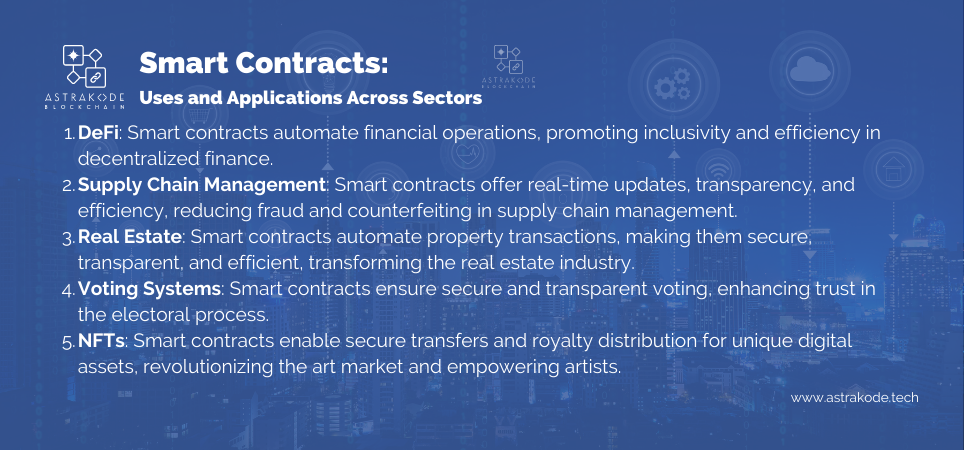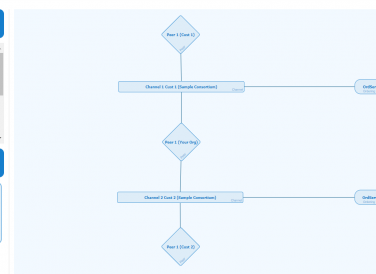
Blockchain: a Beginner’s Guide to Understanding This Revolutionary Technology
Welcome to the exciting world of blockchain! If you’ve ever wondered what this revolutionary technology…

In the vibrant landscape of blockchain technology, smart contracts have emerged as a game-changing innovation, providing a transformative way to execute agreements with efficiency, security, and reliability.
Derived from computer scientist Nick Szabo, smart contracts are self-executing digital agreements. They are fundamentally contracts translated into computer code, where the terms of the agreement between the involved parties are encoded directly into the program. This code, representing the contractual obligations and conditions, resides on a decentralized blockchain network.
Smart contracts‘ defining feature is their ability to execute transactions automatically. They are designed to monitor, enforce, and carry out the obligations of an agreement as soon as the predefined contractual conditions are met.
In essence, smart contracts symbolize a paradigm shift in how agreements are formulated and executed in the digital world. They blend the robustness of blockchain technology with the convenience of automation, propelling a new era of efficient and secure transactions.
Related blog: What is blockchain?
Smart contracts are essentially digital, automated counterparts of traditional legal contracts. They employ software code to automate and self-execute the stipulated terms and conditions of an agreement. These contracts are coded and stored on a decentralized, transparent, and secure blockchain network, making them tamper-proof.
In operation, smart contracts function as self-operating programs that execute when predefined conditions are met. Consider a supply chain blockchain application: a smart contract might automatically trigger payment upon receipt of a delivery confirmation, eliminating the need for manual intervention or third-party mediation.
Interestingly, the implementation of smart contracts drastically reduces the necessity for traditional intermediaries like banks or lawyers, thus mitigating risks associated with fraud, error, or non-compliance. Ethereum’s blockchain platform played a vital role in popularizing these smart contracts by offering a robust framework for their development and application in diverse industries such as finance, real estate, and supply chain management.
Smart contracts’ deterministic nature, combined with their uniform replication across blockchain network nodes, guarantees synchronized and transparent execution of agreements for all participants. Despite the numerous advantages, it’s crucial to remember that the immutable nature of smart contracts demands thorough auditing and testing of the code prior to deployment to prevent potential errors or vulnerabilities.
Smart contracts are digital protocols stored on a blockchain platform, designed to facilitate, verify, and automatically execute the terms of a contract. As the lifeblood of blockchain technology, smart contracts redefine the very notion of contractual agreements with their inherent automation capabilities.
Once smart contract terms are established and deployed on the blockchain, the system becomes autonomous. The contract autonomously executes stipulated clauses when it detects fulfilled conditions. This fundamental attribute sets smart contracts leagues apart from their traditional counterparts, which can be costly, laborious, and vulnerable to errors and manipulation. By contrast, smart contracts, once deployed, are immutable and ensure contractual terms are maintained without a trusted third-party—significantly reducing fraud risks and disputes.
Developing smart contracts demands an understanding of blockchain platforms, programming languages, and legal contract aspects. Blockchain engineers specializing in smart contract writing are pivotal in this process, ensuring the code accurately mirrors the contractual terms and operates seamlessly within the existing blockchain ecosystem.
Popular choices for deploying smart contracts include blockchain platforms like Ethereum, explicitly designed for smart contract execution. Developers now have diverse options on platforms to meet their specific needs, setting the stage for smart contracts to become integral to digital agreements and shape future transactions across industries.
The creation of smart contracts, however, relies on the underlying blockchain platform. Among various platforms available, Ethereum and Hyperledger Fabric are two of the most commonly used for smart contract development.
Developing Smart Contracts in Solidity
Solidity, often considered the bedrock of Ethereum-based smart contracts, is a statically-typed programming language purpose-built for the Ethereum Virtual Machine (EVM). When developing smart contracts on this public blockchain platform, Solidity serves as the cornerstone.
A clear Solidity smart contract example involves Person A and Person B. The terms state, “If Person A sends 10 Ether, Person B sends digital artwork.” This smart contract acts as an automated escrow, ensuring simultaneous Ether transfer and artwork delivery upon conditions fulfillment. This automatic execution underlies smart contract use, erasing delays and fees linked with conventional legal contracts.
At AstraKode, we understand the significance of Solidity in smart contract development, especially for Ethereum-based projects. With our low code approach and visual environment, you can create blockchain networks and smart contracts. Hence, AKB offer comprehensive Solidity support on our platform, facilitating the creation, testing, and deployment of efficient, reliable smart contracts. To experience the simplicity of Solidity smart contract creation firsthand, give Astrakode a try!
Learn more about Astrakode Blockchain.
Venturing into the landscape of enterprise blockchain, we encounter Hyperledger Fabric, an open-source, permissioned blockchain platform designed for use in enterprise contexts. The development of smart contracts, known as ‘chaincode’ in Fabric, offers a distinct flexibility. Chaincode can be written in general-purpose programming languages such as Go, Java, and JavaScript, widening the scope for smart contract development.
To illustrate, consider a supply chain use case. A chaincode smart contract can dictate, “When Product A reaches Location B, change its status to ‘Delivered’.” This automates a crucial supply chain step, guaranteeing instant updates based on preset conditions. This swift, automated process embodies smart contracts, offering a crucial, efficient, trustless mechanism in today’s digital landscape.
To sum it up, whether it’s Solidity for Ethereum or Chaincode for Hyperledger Fabric, the development and application of smart contracts are playing an instrumental role in driving the next generation of blockchain innovation. By automating contract execution and eliminating the need for intermediaries, smart contracts are paving the way for a more decentralized and efficient digital future.
Astrakode also supports the development of Hyperledger Fabric chaincode. Our commitment lies in ensuring a seamless process for creating and deploying smart contracts on Fabric. Interested in exploring how simple it can be? Try out Astrakode today!
By harnessing the potential of smart contracts, industries can experience unprecedented levels of transparency, security, efficiency, trust, and cost-effectiveness.

In the revolutionary domain of blockchain technology, smart contracts have emerged as a versatile tool, underpinning a myriad of use cases across various sectors. Here, we delve into some key applications where smart contracts are reshaping the traditional ways of executing transactions and operations:
These are just a few examples of the myriad applications of smart contracts. By automating transactions, enforcing agreements, and diminishing the reliance on intermediaries, smart contracts are poised to revolutionize multiple industries, ushering in an era of decentralization, efficiency, and enhanced security.
As digital transformation advances, smart contracts find increasing applications across industries. Many platforms leverage these self-executing agreements on blockchain to enhance efficiency, security, and transparency. Here, we delve into some pioneering examples of smart contracts at work.

1. Aave: Decentralizing Finance with Smart Contracts
Aave, a leading name in the Decentralized Finance (DeFi) space, relies extensively on smart contracts for its operations. It is an open-source, non-custodial platform where users can lend and borrow crypto assets. Ethereum-based smart contracts execute the lending and borrowing process. These programmable contracts automate agreements between lenders and borrowers, ensuring secure, transparent, and immediate transactions without intermediaries. This decentralized approach to finance is significantly disrupting the traditional financial landscape, fostering economic inclusivity.
2. IBM Food Trust: Enhancing Food Safety with Smart Contracts
IBM Food Trust, a blockchain-powered initiative, leverages smart contracts to revolutionize the supply chain management of food items. These smart contracts are used to track and verify the provenance of food items, from their origin to the retail shelves. The traceability and transparency offered by smart contracts ensure food safety, minimize the risk of fraud, and boost consumer trust. With these automated agreements, the platform can rapidly pinpoint issues in the supply chain, significantly reducing the time and cost involved in food recalls.
3. Propy: Disrupting Real Estate Transactions with Smart Contracts
Propy, an online real estate marketplace, utilizes smart contracts to facilitate the buying and selling of properties. This groundbreaking use of blockchain technology in the real estate domain has resulted in faster, more efficient, and secure transactions. Buyers and sellers enter into a smart contract, which executes automatically upon fulfillment of stipulated conditions. Automated and transparent processes handle property ownership transfer, payment transactions, and agent commissions. With smart contracts, Propy is eliminating the conventional hassles and delays associated with real estate transactions.
These examples depict the powerful potential of smart contracts in redefining business operations across industries. The fusion of blockchain technology with the capability to automate agreements is paving the way for a future where transactions are not only efficient and secure but also transparent and reliable.
As the world increasingly embraces the potential of blockchain technology, the evolution of smart contracts becomes ever more significant. These digital marvels are continually advancing, opening a vista of opportunities that promise to redefine our understanding of transactions and agreements. Let’s explore some anticipated future developments in the realm of smart contracts.
The future of smart contracts is brimming with possibilities. Ongoing security improvements, legal acknowledgment, and cross-chain interoperability are shaping a promising future that could revolutionize contract understanding and execution. In the digital era, smart contracts will undoubtedly remain pivotal in blockchain technology’s growth and evolution.
Smart contracts are truly revolutionizing the way we perceive contracts and trust. Their automated and secure nature brings a new level of efficiency and transparency into transactions, ushering us towards a more decentralized and equitable world.
Recognizing the potential of such transformative technology, Astrakode Blockchain (AKB) provides comprehensive support for Solidity and Hyperledger Fabric’s Chaincode. Astrakode Blockchain (AKB) simplifies smart contract creation, testing, and deployment. Our low-code approach and visual environment enhance blockchain development’s accessibility and efficiency. Astrakode assists with Solidity and Hyperledger Fabric’s chaincode, powering smart contracts for the next blockchain innovation. With automated contract execution and no intermediaries, smart contracts pave the way for a decentralized and efficient digital future. Let Astrakode help you be part of that future!

Welcome to the exciting world of blockchain! If you’ve ever wondered what this revolutionary technology…

In today’s fast-paced world, the demand for quick and efficient solutions has never been higher….

A few days ago the first demo video of AstraKode Blockchain was published on AstraKode’s YouTube channel. The video showcases…